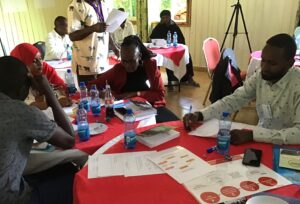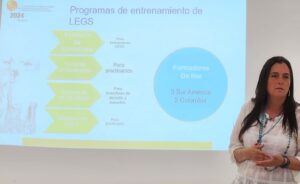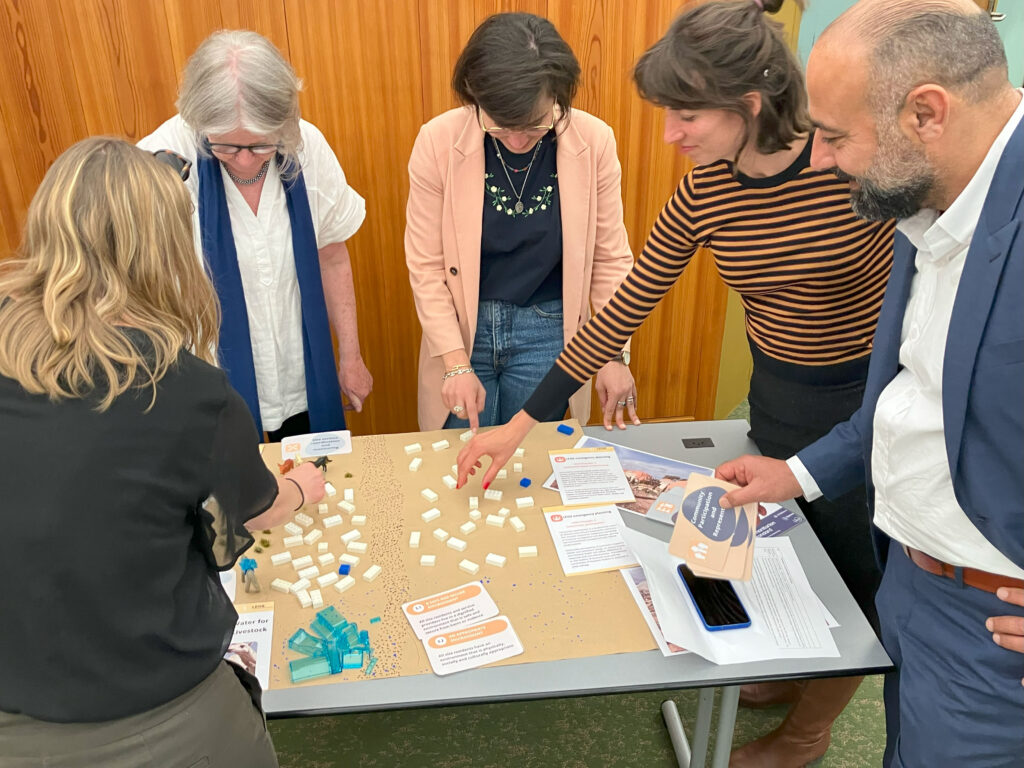The last few months have seen a range of webinars, briefings and trainings on the Livestock Emergency Guidelines and Standards (LEGS), meaning more humanitarian staff are being equipped to better support livestock-keeping communities before, during and after emergencies.
Expanding horizons: innovative LEGS trainings in Kenya and Colombia
Recently, expert trainers in Kenya have been piloting an updated LEGS Core Training based on the 3rd edition of the LEGS Handbook to ensure humanitarians and livestock specialists alike can provide the best support possible when emergencies strike.

Participants discuss applying LEGS to their work at a Core Training in Isiolo, Kenya June 2024. Credit: Dr Kisa Juma Ngeiywa
At a LEGS Core Training in Isiolo, Kenya, participant Loldoos Billy Saiguran, Samburu County Livestock Production Officer, shared his view on the updated training: “Here in Samburu County we frequently face disasters such as droughts and floods. Despite the presence of several NGOs and even with substantial support, livestock-keeping communities often remain marginalised. This shows that something is not working. After this training I can see how proper application of LEGS will greatly improve the situation, leading to better outcomes for those affected by crisis.
LEGS training has been both an eye-opener and a practical guide for my work. By using these standards I will be able to use emergency resources better and take a more coordinated approach. Ultimately I know this will have a significant impact on the lives and livelihoods of the communities I support.”
Over the past two years, LEGS has been actively supporting experienced trainers to enhance awareness and implementation of LEGS in Colombia. Our dedicated trainers have been collaborating with the Colombian Ministry of Agriculture, the Food and Agriculture Organization, and various livestock producers’ associations to successfully deliver a range of training courses promoting LEGS.

Julia presents the LEGS training programme in May 2024. Credit: Julia Lema
In May, Julia Lema, one of our committed trainers, showcased the importance of LEGS at the Third Inter-American Conference on Disaster Risk Reduction and Climate Change Adaptation held in Manizales, Colombia.
- Keep an eye out for the updated trainings based on the 3rd edition of the LEGS Handbook, which will be offered by expert LEGS trainers in the coming months
- The LEGS Core Training Course is also available online, bringing this vital training to even more people worldwide
Virtual events bring together African and Asian humanitarians & livestock experts
Thanks to the leadership of LEGS national partners Community World Service Asia and The Alliance for Sustainable Livestock, two lively LEGS webinars took place in June 2024.
The webinar Equipping Africa For Livestock Emergencies: Launch of LEGS Handbook brought together more than 100 public and private sector organisations from across the continent working in livestock systems, climate change, emergencies and animal health care delivery to discuss critical issues surrounding livestock emergencies and Africa’s readiness in the face of climate change.
An Introduction and Update on LEGS webinar also saw 68 participants from Pakistan and across Asia engaging in discussions on the importance of collaboration, planning, and coordination in effectively implementing livestock emergency response.

Attendees at the Community World Service Asia LEGS update webinar in June 2024
We deeply appreciate the fantastic efforts by our partners to share the difference LEGS can make. We encourage organisations working across humanitarian emergencies and livestock protection to hold your own webinars or events to spread the word.
- Get in touch with us to organise a LEGS briefing event: coordinator@livestock-emergency.net
Connecting with global humanitarian networks
LEGS also participated at the 2024 Humanitarian Networks & Partnerships Weeks (HNPW) conference. As one of the largest events of its kind, HNPW brings together a diverse group of participants from the UN, NGOs, Member States, the private sector, the military, and academia to tackle shared challenges in humanitarian affairs. It was an incredible opportunity to exchange ideas and collaborate with leaders across the sector.
During the conference, we took part in simulation games, integrating LEGS with other vital humanitarian standards. These exercises highlighted the profound impact of a multi-standard approach, enhancing response efficiency and effectiveness during crises.

LEGS taking part in a standards simulation set in Baidoa, Somalia at HNPW in May 2024. Credit: Minimum Standards for Camp Management
In addition, we connected with the Humanitarian Standards Partnership Steering Committee, focusing on the pivotal role of standards in improving humanitarian actions for those caught in emergencies. Our discussions explored innovative strategies to enhance the global application of these standards, aiming for better outcomes for communities in need.
Stay up to date with the latest LEGS news, events and resources – sign up to our bi-monthly newsletter

